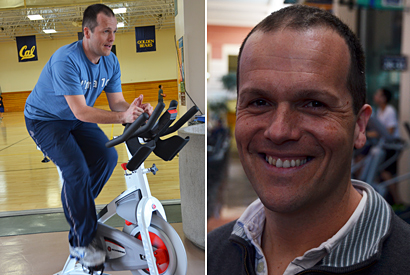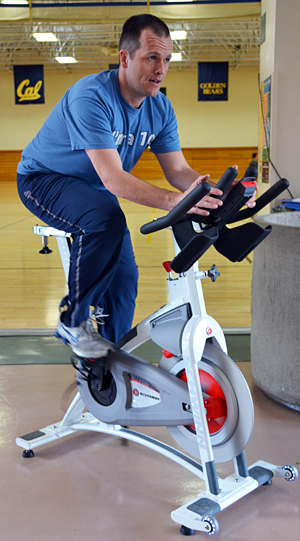Once a 300-pound weakling, now champion of fitness and health
When Devin Wicks is on the job, helping people get healthy, lose weight and shape up, he’s got a special kind of credibility: He’s been there. Once a 300-pound heavyweight, he got active, shed 100 pounds — and now is a familiar blur of action around the Recreational Sports Facility as director of fitness and health operations for UC Berkeley.

April 23, 2013
![]() BERKELEY — When Devin Wicks is on the job, helping people get healthy, lose weight and shape up, he’s got the full resources of a research university behind him. But more than that, he’s got a special kind of credibility: He’s been there.
BERKELEY — When Devin Wicks is on the job, helping people get healthy, lose weight and shape up, he’s got the full resources of a research university behind him. But more than that, he’s got a special kind of credibility: He’s been there.
Wicks — a familiar blur of action around the Recreational Sports Facility as director of fitness and wellness operations for UC Berkeley — once weighed 300 pounds. Or more. He’s not sure because he stopped weighing himself.
Where now he leads killer spin classes, as a high-school student he liked nothing more than to lounge in front of the television and eat. Salty, sweet, you name it — “all the good stuff,” he says, meaning just the opposite.
As the pounds piled up, he turned deaf ears to his parents’ concerns. It wasn’t that he didn’t know there was a problem; at some point, he stopped allowing any photos of himself except from the shoulders up. He sat, and he ate.
Then one day, he got fed up. And he made one simple change.
“I stopped turning on the TV.”
More changes cascaded from that first one. Wicks found himself getting out more and doing more. And eating less.
It took him two years — but he lost 100 pounds, and gained a life.
“It’s all about doing small things, many times over,” he says.
That might be a worthy mantra for the many programs Wicks has helped develop and run at Berkeley, especially WorkFit, the employee health and fitness program, and two specialized offshoots: WorkStrong, a UC-wide program for employees who have been injured; and WorkFit U, an intensive program for one small group.
“Our philosophy is: You are the expert; we facilitate changing the behavior,” says Wicks.

Devin Wicks shows off his spin technique at UC Berkeley’s Recreational Sports Facility. (NewsCenter photo by Carol Ness)
He didn’t start out to become a health and fitness expert, and likes to half-joke that he had to become a fitness trainer to keep the weight off. But when his TV went dark, he discovered a love of dance — modern, jazz, tap, hip hop. He performed and was an instructor before arriving at Berkeley as an undergraduate.
It was the early 1990s, and aerobics were big. The campus was looking for trainers, and Wicks needed a job. “I thought, ‘I can so do that,’ “ he remembers. “It led to my career.”
Wicks started working at RSF as student, and stayed on after graduation as a contract staff trainer and instructor while he went out and forged a career in the health and exercise industry. From his chair as director of a health club, he worked his way up in the fitness industry and then, with a partner, started producing spin bikes as Peleton Cycle.
When the company folded, Wicks found his way back to Berkeley about 10 years ago, and started applying what he’d learned from the fitness industry here — especially ideas around bringing together people who do the same work, and getting creative.
The most visible result is WorkFit, which Wicks created with Alice Kubler, an administrator at the Haas School of Business, first at Haas and now all over campus.
“It’s basically a group exercise,” he says. But instead of heading to the gym, staff and faculty get to take part in their workplace, mainly doing circuit training and yoga, along with some Zumba and outdoor activities.
“WorkFit is the start of a whole new way of thinking and living,” Wicks says. “It’s not to get to a goal, but because you want to live a better life.”
In building WorkFit, Wicks capitalized on an existing program called Group X, vastly increasing its reach, with some 50 to 75 classes running weekly.
“It’s the best-kept secret on campus, Wicks says.
The WorkFit U intensive program is the Berkeley version of The Biggest Loser, without the humiliation factor, or prizes. People have to apply, and about a dozen are selected. Then an individualized program of education, exercise, nutritition, stress and sleep management is designed for each, with built-in assessments. “We build the biggest support structure around them,” Wicks says, “As we go along we start to pull it away, and hopefully you have new habits.”
The results, he says, have been clear, in pounds lost, in the number of diabetics who have been able to reduce or stop taking their insulin, in lowered blood pressures — and in people “getting passionate about going out and doing something.”
There’s an upside for the university, too, he points out: “Healthcare costs aren’t coming down. Getting people healthier … there’s a real dollar value to it. It’s trackable through health costs, absenteeism, job performance.
“People are more engaged in their jobs and their lives if they feel better,” he adds.
As a result, Wicks is spending more of his time spreading the work throughout the UC system — as well as to local businesses like Annie’s Homegrown, the Berkeley-based food company, and to the California Department of Public Health offices in Richmond.
But he’s also still a fixture at RSF, running Berkeley’s personal training program, the instructional fitness program and weight room operations. He no longer has enough time to coach the dance team, but he’s still the go-to guy for the women’s swim team, mostly for spinning and team development. And, like all of his staff, he still teaches classes.
“I love it,” he says. “I get to wear sweats and sneakers all day.”
At 6 feet tall, he maintains his weight at a muscular 200 pounds. And he’s not depriving himself to do it.
“I have my mimosa Sundays,” he says. “Come on! I move a lot so I can eat.”
===
To meet other persons of interest, click above.
Persons of Interest is a regular feature on the UC Berkeley NewsCenter. Know a member of the campus community — staff, student or faculty — who might make a good subject? Send us a note at [email protected].